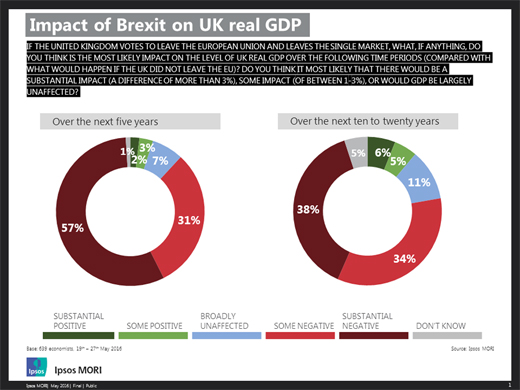Economists' Views on Brexit
Ipsos conducted an online survey of members of the Royal Economic Society and the Society of Business Economists on behalf of the Observer. The survey asked economists for their professional opinions on the likely effect of Britain leaving the EU and the single market on a variety of economic indicators, including real GDP and unemployment.
Of the 639 economists who responded:
- 72% thought it the most likely outcome would be a negative impact on UK real GDP over the next 10 to 20 years, if the UK left the EU and the single market. This compares with 11% who thought that a positive impact on real GDP would be the most likely outcome.
- 88% thought it most likely that real GDP would be negatively impacted in the next 5 years, if the UK left the EU and the single market. 4% thought GDP would be positively impacted over the same time period and the 7% thought GDP would be broadly unaffected.
- Of those stating that a negative impact on GDP in the next 5 years would be most likely, a majority cited loss of access to the single market (67%) and increased uncertainty leading to reduced investment (66%).
- 73% of respondents thought that real household incomes in the UK would be lower over the next 10 to 20 years, if the UK left the EU and the single market. This compares with 10% who thought that incomes would rise and 13% who thought that incomes would be broadly unaffected.
- Opinions on the longer term effects on unemployment were more mixed. 45% thought that the UK unemployment rate would be higher over the next 10 to 20 years if the UK left the EU and the single market. However, 33% of respondents felt that the unemployment rate would be broadly unaffected and 17% thought the unemployment rate would be lower.
- 68% of respondents thought that the UK leaving the EU and the single market would increase the risk of the economy experiencing a serious negative shock. 22% thought it would make no difference and 8% thought it would reduce the risk.

Gideon Skinner, Head of Political Research at Ipsos, said:
“We know that the economy along with immigration is one of the two key issues driving voters’ decisions in the referendum. At the same time, though, the public is conflicted over the potential long-term economic impact of Brexit – while half do think it would be negative for Britain’s economy in the short term, in the long term the argument is yet to be won, and when it comes to their own personal standard of living, just under half think it would make no difference. At the same time, people are looking for information to help them make up their minds, and groups such as academics, along with friends and family and small businesses, are among the most trusted – especially for remain supporters.”
Technical note
639 respondents completed the online survey between 19th to 27th May 2016. The survey was undertaken online with invitations sent out to non-student members of the Royal Economic Society (RES) and the Society of Business Economists (SBE). Reported figures are based on unweighted data and so should only be taken as representative of those who responded. Overall 3,818 invitations were sent out, with a response rate of approximately 17%. For questions where respondents were asked to provide reasons for their answers, respondents were presented with a pre-defined prompt list.



